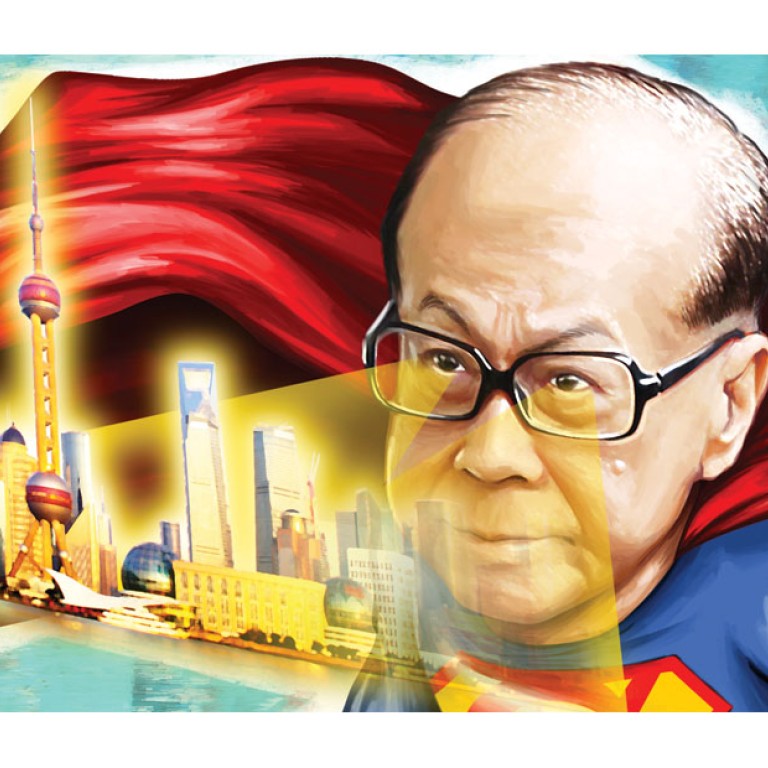
Li warning heats up Hong Kong-Shanghai debate
Cheung Kong boss' comments spark talk about the future of the city under the shadow of the mainland's landmark free-trade zone plan
Hong Kong dealmaker par excellence Li Ka-shing, fondly known to locals as Superman, says Shanghai's free-trade zone could be Kryptonite to the city in which he built his fortune.
Beijing's landmark plan to create a Hong Kong-like free-trade zone in Shanghai - the mainland's biggest economic experiment since the creation of Shenzhen, its pioneering special economic zone - has sparked a debate over whether it would lead to the twilight of Hong Kong.
Li, Asia's richest man, joined the debate on Tuesday, urging Hongkongers to pull together to accelerate their city's development and prevent it from being rapidly eclipsed by Shanghai and other potential rivals.
Hong Kong’s ability to grow as the gateway … will sooner or later be over
The free-trade zone in Shanghai, the mainland's first, is to be officially launched towards the end of the month.
New regulations governing about 50 aspects of its operation were expected to be released at the launch ceremony, government sources said.
They said another set of rules, aimed at attracting foreign investment to the zone, might be released by the end of the year, depending on its progress.
The plan is widely considered to be personally led by Premier Li Keqiang.
Political and economic analysts said the Shanghai plan was politically important for Li, who picked the metropolis as his first major testing ground for long-awaited economic reforms.
Li Ka-shing's rare comments to the media reinvigorated the discussion over the plan's potential fallout for the city.
"It will have a big impact on Hong Kong," said the chairman of Cheung Kong and Hutchison Whampoa. "It has different aspects, including financial services. When the yuan becomes fully convertible, it will benefit the development of Shanghai."
Li said Hong Kong would lag behind if it did not accelerate the pace of its development.
His comments were published on the front pages of many local newspapers yesterday.
"The general public in Hong Kong is now very much consumed by local politics and may have little interest in what is going to be a major event in China's capital account liberalisation," said Liu Ligang, ANZ's chief China economist.
"To some extent, the Chinese authorities may be worried about a too politicised Hong Kong leading up to its 2017 general election," Liu said. "They also need to hedge the risk that Hong Kong may no longer fulfil its important role for China's future financial reform. Shanghai is a natural hedge."
China declared about five years ago it wanted Shanghai to be one of the world's top three financial centres by 2020, on par with New York and London. Some analysts were still doubtful, however, whether Shanghai could deliver the goods, as a world-class financial centre requires more than just local government support but free capital flows and a fair and independent legal system as well - areas in which Hong Kong still retains a high reputation.
Stephen Green, the head of research for Greater China at Standard Chartered, said the potential of Shanghai's free-trade zone was "huge" but the market was still waiting for detailed rules.
"There is discussion of allowing free convertibility of the yuan within the zone, which, if it materialises, would make the zone partly also an offshore financial centre, potentially somewhat like Hong Kong," Green said.
Liu said: "If what can be done in Hong Kong can now be done in the free-trade zone in Shanghai, many businesses will migrate to Shanghai."
Initially, he said, multinational firms might still prefer to have regional offices in Hong Kong overseeing their business in Shanghai, given Hong Kong's fairer and safer legal environment in case of any legal dispute.
The mainland state media has compared the importance of the free-trade zone in Shanghai to that of the Shenzhen special economic zone, crafted under the personal supervision of Deng Xiaoping three decades ago.
Green said Shanghai's zone would be different from Shenzhen in many respects. In particular, imports and exports would be duty-free and the yuan would be convertible, so the reforms in Shanghai would be far more important than Shenzhen's.
"Shenzhen was focused on attracting firms that would manufacture for export, although as the economy developed, many firms established in these zones turned to selling to China," he said.
Mainland provinces including Guangdong are keen to follow Shanghai with their own free-trade zones. Li Keqiang has said he wanted Shanghai's zone to be copied elsewhere once it succeeded.
"China will eventually be completely open," Secretary for Financial Services and the Treasury Chan Ka-keung said at a recent forum. "Hong Kong's ability to grow as the unique gateway while China is closed - that day will sooner or later be over."
But he said: "We should not be afraid … The more open China is - even though that means more competition from other Chinese cities - the more it will provide Hong Kong with opportunities."

